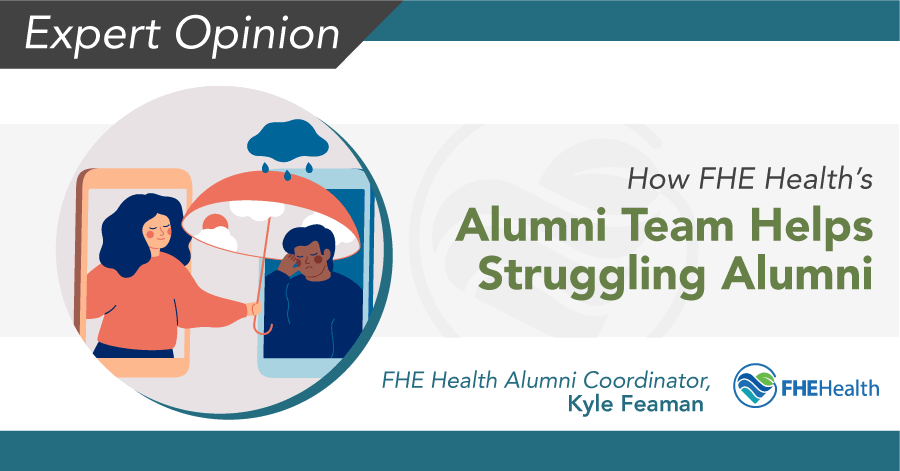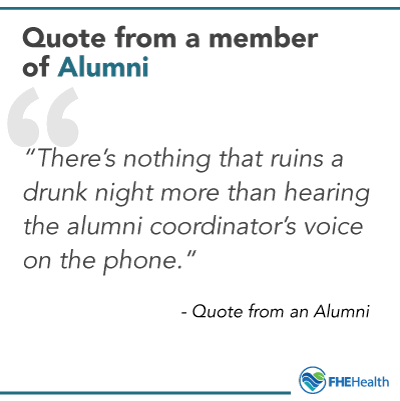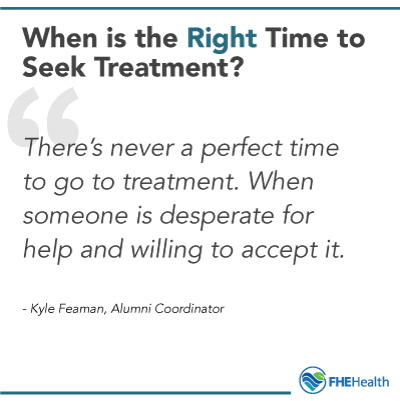
The transition from inpatient treatment to life after rehab is rarely easy. That’s because successfully maintaining long-term recovery is often harder when job, family, and other life stressors re-enter the picture. Research has also shown that it’s not uncommon to struggle during this post-treatment phase of recovery: Relapse rates are higher in the first year of sobriety, and among those with a primary mental health diagnosis like major depressive disorder or a personality disorder, it may be necessary to step up outpatient supports or tweak a medication regimen.
Supports are therefore critical for alumni, especially those who may be struggling to stay healthy and/or sober as they re-acclimate to daily life. To learn more about our Alumni Program and how it supports alumni—particularly those who are floundering—we reached out to FHE Health Alumni Coordinator Kyle Feaman. Feaman’s expertise on this topic stems from his own experience in long-term recovery: He and Alumni Director Molly Mammen “went through treatment here and know what it’s like.” After he got sober in 2013, Feaman went on to serve as a tech at FHE two years later and eventually accepted his current position in 2019.
Our wide-ranging conversation covered a lot of ground, much of it unfamiliar to families of prospective patients. What many families are not aware of is the important supportive role that our alumni team plays in helping our former patients stay on a healthy and/or sober path. In the questions that follow, Feaman will describe what that looks like, provide some real-life examples of alumni whom FHE has been able to help, and offer words of support to those who may be struggling.
The Alumni Department’s Role in Supporting Recovery
FHE alumni represent a broad group of people. They include those who have just left treatment for a mental health disorder and those who have been sober and in recovery from substance abuse for years. Many of our alumni are local, and many of them live in other states.
When we asked Feaman about how his team supports alumni, he said one way was to provide plenty of meetings and initiatives that help alumni feel connected and supported. Depending on whether they’re local or in another state, alumni can:
- attend an in-person Wednesday night meeting or a Tuesday discussion on Zoom
- stay in touch via an alumni Facebook group and regular phone calls from the alumni team
- get daily inspirational readings for recovery
- take part in service initiatives
- attend reunions and retreats where they can hear from inspirational speakers and strengthen their connections
In these ways, the FHE team strives to stay in touch with our alumni and let them know we’re here if they need us.
Offering Help and Accountability After Discharge
 Another important aspect of the alumni team’s work is following each patient after discharge to ensure they have what they need to be successful in their recovery. Often that entails an aftercare plan with support from a psychiatrist and a therapist. 12-step groups and other supports may also be recommended.
Another important aspect of the alumni team’s work is following each patient after discharge to ensure they have what they need to be successful in their recovery. Often that entails an aftercare plan with support from a psychiatrist and a therapist. 12-step groups and other supports may also be recommended.
How does the alumni team factor in? When a patient is discharged, they begin to get monthly calls from the alumni team. The goal of these calls is to find out how alumni are doing and offer support if they are struggling. That might mean offering a treatment referral or providing a list of support groups. Sometimes it may be to leave an encouraging voicemail.
A once-monthly call or voicemail message might not seem that impactful, but for a struggling alumnus or alumna, it can be the lifeline that pulls them back into the orbit of recovery. As illustration, Feaman shared the following quote from a member of the alumni: “There’s nothing that ruins a drunk night more than hearing the alumni coordinator’s voice on the phone.”
“We are able to offer different levels of support, depending on how open alumni are with us,” Feaman continued. With local alumni, “we can give advice, assist, and are hands-on.” With out-of-state alumni, “we’re working with them on what they need from us.” The supports can look different depending on what’s going on in the person’s life. Sometimes they need meetings or treatment options. Sometimes they just need a listening ear.
Examples of When People Reached out to Alumni Team for Support
What might that individualized support look like in terms of real-life scenarios? Feaman offered two examples. The first was a person who had come to FHE for mental health treatment. After her discharge, “she was very active with our Tuesday Zoom meeting and was logging in every day and trying to continue to work and needed extra support,” Feaman recalled. “We continued to be with her and support her in her journey where she was at. We encouraged her to reach out for professional supports and referred her to another facility so she could get the support she needed at the level she needed.”
In the other instance, one of the alumni reached out to Feaman out of concern that another alumnus was drinking again. “He was drinking and out of state,” Feaman recalled. “He needed to talk and some support. After we spoke, we agreed that treatment would be the best plan.” Talking with a member of the alumni team was the persuasion he needed to seek help.
What the Alumni Team Does to Stay in Close Touch with Alumni
 The alumni team stays in close touch with alumni from around the country by “continuously checking in with people.” That translates to “a lot of phone calls,” according to Feaman, who said roughly 50 percent of alumni called answer the phone.
The alumni team stays in close touch with alumni from around the country by “continuously checking in with people.” That translates to “a lot of phone calls,” according to Feaman, who said roughly 50 percent of alumni called answer the phone.
Those who answer the phone may be doing great or not so great. The goal of the alumni team is to “meet people individually where they’re at and see what we can do to continue to assist them,” Feaman said.
He and the team also make “yearly anniversary calls” to recognize the milestone of being one year sober or one year out of mental health treatment.
The Importance of Getting Help Quickly When Someone Is Slipping
Why are timely help and intervention important when someone is slipping (whether that is in newfound sobriety or because of recurring mental health symptoms)? Feaman emphasized that “there’s never a perfect time to go to treatment.” The critical moment is “when someone is desperate for help and willing to accept it.”
With someone who is struggling with a substance abuse problem, “you have to strike when the iron is hot, since it’s a very short window,” Feaman said. “The hard part for me was I would want help but wasn’t willing to accept it.”
Words for Someone Who Is Struggling and Concerned About Getting Help?
Feaman re-emphasized that there’s no perfect time for treatment and that everyone has a concern of one sort or another when they’re considering getting help. There was one thing, though, that he deemed critical to recovery:
I did have myself, and if we don’t lose that, we have a chance. You don’t have to wait until you lose it all. If you know deep down inside that you know you need help, it’s the right decision. It’s easy to talk yourself out of it but you don’t have to do.
Are you losing yourself to drugs and alcohol or a mental health problem? We may be able to help. Contact us today.






